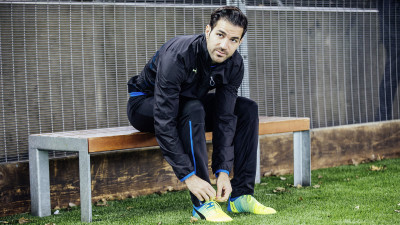The Chelsea midfielder explains how winning the 2010 World Cup with Spain made his first footballing recollection a reality.
“My first football memory was Zinedine Zidane scoring two goals in the final of the World Cup at France in 1998,” Cesc Fabregas told Goal after thinking for a few moments about his footballing idol.
He was only 11 years old but was already a midfielder. Back then he played for local club Mataro and even though he didn’t know it yet, the following decade would take him to the same place as his first football memory. His road started in 2008 when he scored a decisive goal for the Spanish national team, a goal that would affect the destiny of La Roja.
The winning penalty against Italy at Euro 2008 saw Spain overcome their status of perennial quarter-final victims. They had not even made it past the last 16 of the 2006 World Cup. Cesc, buoyed by the figure of Luis Aragones who had handed him his debut at the age of 18, reminisces fondly of the late tactician.
“He is a person who left a big mark on me, both mentally and psychologically,” the midfielder says, conceding: “I never liked being on the bench, that’s how I am.”
Following the fiasco at World Cup 2006 in Germany, when they were defeated by France, Spain played a friendly against Peru and Cesc came on with the scores at 1-1. “We won 2-1 after I provided an assist to Joan Capdevila,” he remembers with half a smile.
As he returned to the dressing room “with a very serious expression”, Aragones appeared like a whirlwind. “He grabbed me by the neck and started shouting at me because I was angry.”
Cesc insists he wasn’t angry and, even if he were, having not started the match he knew he couldn’t say so as he was the youngest player in the squad. Without letting go, Aragones kept shouting: “who gave the assist for the goal? Was it me, perhaps? Or was it you?”
Cesc laughs about it now. But back then, not so much. In those days, he didn’t have the list of titles he boasts today. His first big trophy, Euro 2008, perfectly illustrates the relationship between coach and apprentice.
“In the first game against Russia, I started on the bench and then came on in the second half. I gave the pass to David Villa for the third goal and scored the fourth, which was also the first I had scored with the national team,” he recalls. “I was shattered at the end. I wanted to give everything and I went away happy because I thought I had done well in the 25 minutes I had played.”
Cesc recalls that “the day after the games, we would usually go out for a walk out on the pitch while Aragones gave us a talk about the match from the previous day.
“The first thing he said was that my attitude had been shameless and he tore into me for that” – in front of the entire team. “That got to me a lot,” he adds. “And even though I never knew if he did it intentionally, I ended up having a fantastic Euros.”
That penalty against Italy confirmed the huge expectations of the young midfielder who, now fully matured at the age of 28, already knows what it means to be decisive in a World Cup, having given the assist to Andres Iniesta in that unforgettable final against Netherlands in South Africa in 2010.
Very few young men get to experience what their idol feels when they win a World Cup. But Cesc is one of them.
“That’s a moment that can never be erased both individually and collectively – and to experience it as one of the main protagonists is something amazing,” he said.
Ten years after his debut, he is one of the veterans – only Iker Casillas and Sergio Ramos debuted for the national team before he took up the No.10 shirt. But he isn’t looking back at the World Cup and two Euros he has won in the past.
“I’d prefer to think about those things when I am old and bored at home, not now while I’m still playing and the demands are so high. I prefer not to look back on all the good things because I want even more and even better things in the future.”
Goal.com
This page has been viewed 598 times


























